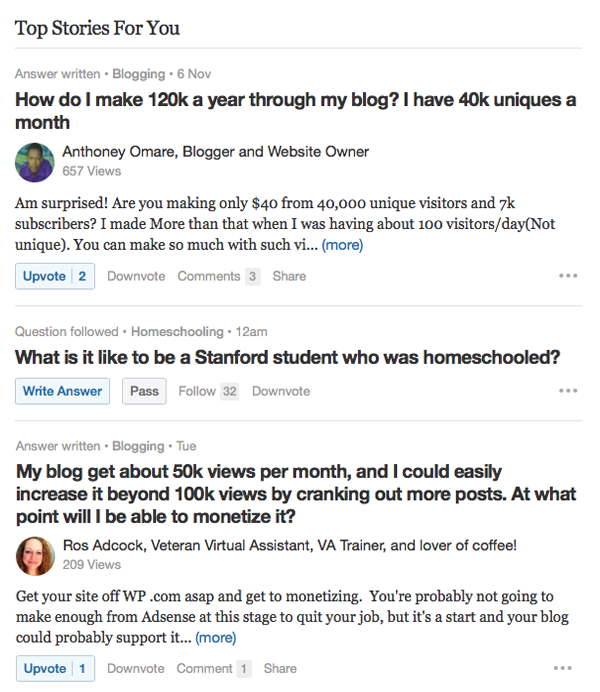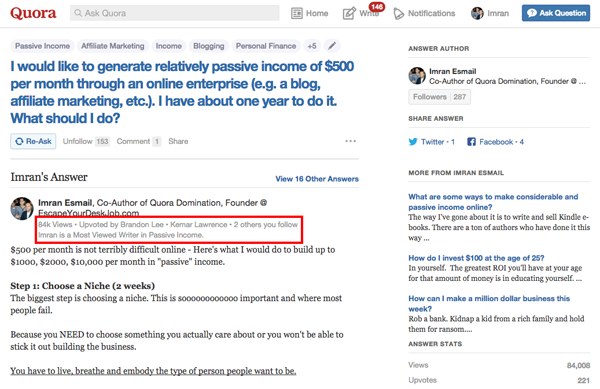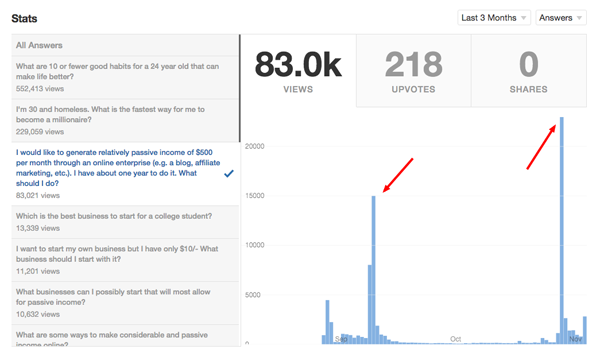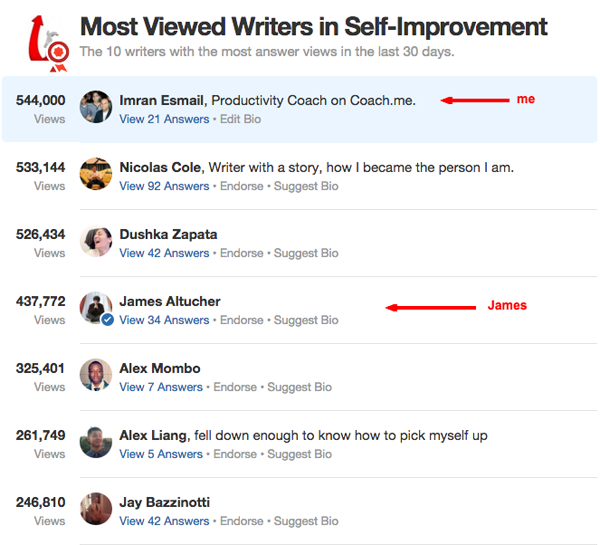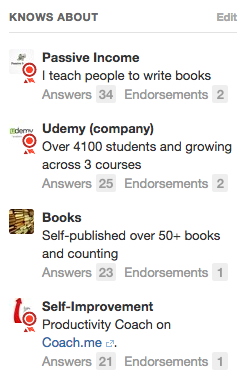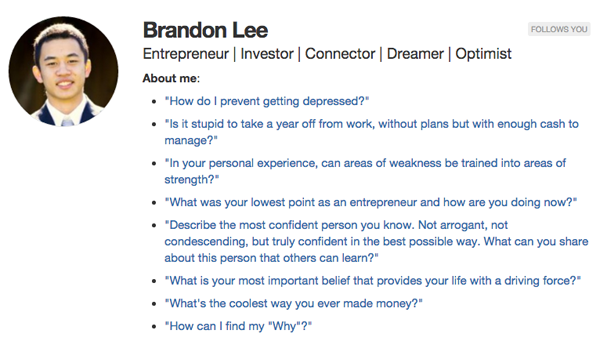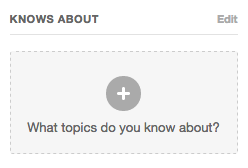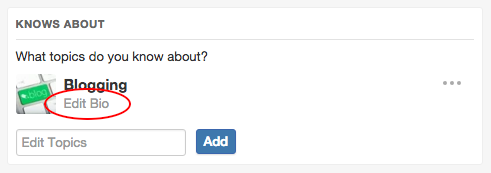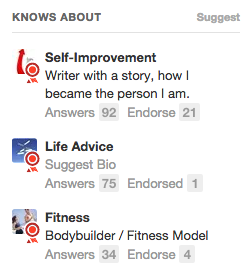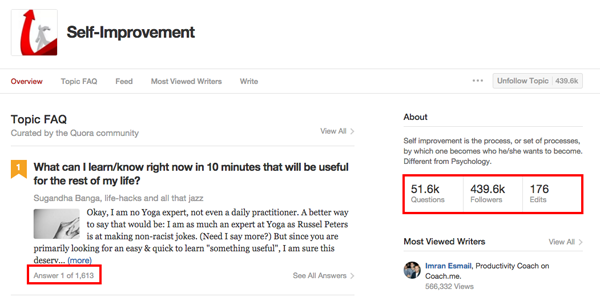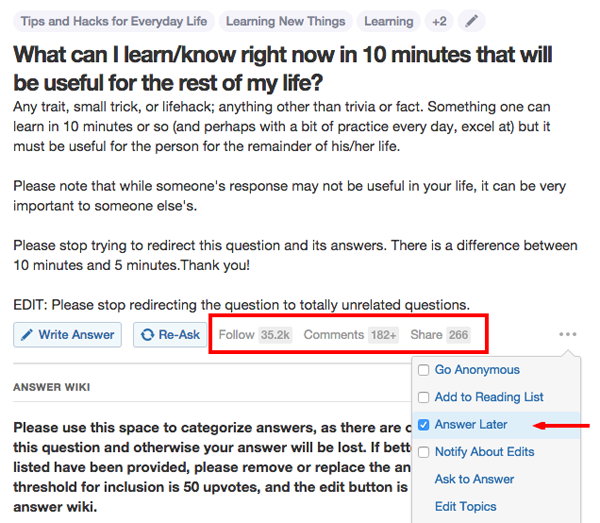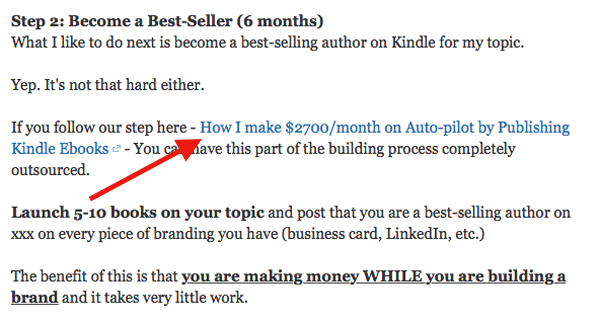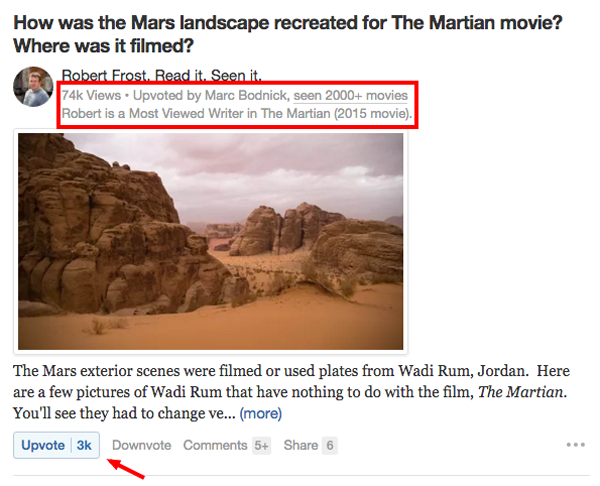
Frustrating, isn’t it?
You work tirelessly on your content – but no one reads it.
It’s like giving a presentation to an empty room. No matter how much insight you have to share, nobody’s there to even notice.
You feel certain that if you could only get some more traffic to your blog, the content love would flow.
But even when you promote the heck out of your latest post, the following week you have to start the process all over again.
It’s exhausting.
But what if there was a strategy that could drive traffic not just to your latest post, but future ones too?
And what if that same strategy was as effective as guest blogging for getting new visitors, but was quicker, easier and didn’t require you to pitch your ideas to anyone?
What if by using that strategy you’d be rubbing shoulders with some of the biggest names on the web?
Wouldn’t you want to know what that strategy is?
Quora – The Surprising Traffic Driver for Savvy Bloggers
Have you heard of Quora?
It’s the Q&A platform where anyone can post a question and get answers from experts in the community.
Here’s what it looks like in action:
Even though Quora was launched way back in 2009, you might not have encountered it until recently.
But make no mistake, these days Quora is a big deal.
Everyone from Ashton Kutcher to professors at MIT and even Barack Obama have taken their turn answering questions.
However, if you’ve spent any time on the platform, you might wonder how it could help you as a blogger.
You may even see Quora as a potential threat – yet another distraction dragging you away from the serious work of running your blog.
If so, you might be surprised to learn that Quora can be a major source of traffic for bloggers.
Don’t believe me?
Right now, Quora is the number-one traffic driver for my blog.
Along the way, my answers on the platform have hit over 1,000,000 views, and I’ve been featured three times in the Quora Daily Digest that goes out to up to 2,000,000 people.
And all of this has happened in just six months.
The Benefits of Quora for Smart People with Answers
When you think about it, Quora is the perfect platform for bloggers to demonstrate their knowledge and expertise.
After all, most of us blog to help our readers with the problems they wrestle with, and a Q&A format is the purest expression of helping people with their problems.
As a blogger, not only will you find Quora a natural community in which to participate, but you’ll get several benefits from doing so.
Benefit #1: Quora Is a Source of Long-Term Traffic
I’ve already mentioned the traffic potential of Quora, but an additional benefit is that answers posted on the platform can continue to drive traffic months after being created.
For example, I still receive significant traffic from one post I wrote back on August 23rd, 2015:
Nearly three months later, people are still finding my answer to this question about passive income, and when someone “upvotes” it (the Quora community’s way of giving support for an answer), my answer appears in their feed and is visible to all of their followers.
The result? More traffic comes back to my blog as well as a ton of new opt-ins for my email list.
Quora’s Stats page shows how my answer has received 83K views from the community.
In practice, the traffic generation effect can last much longer than just two or three months.
Tony Stubblebine, the founder of Coach.me, reports that a Quora post he wrote about meditation last year continues to bring him traffic to this day.
Remember, each answer you write can become an asset that brings you traffic for years to come.
Benefit #2: Quora Lets You Establish Yourself as an Authority
How would you like to be known as the most viewed writer in your topic area?
That’s what I was able to do in Self-Improvement, a seriously competitive topic.
Now my name stands next to James Altucher in the Quora rankings:
You might think you need to post regularly to maintain your ranking, and while that’s somewhat true, rankings last longer than you might think. My colleague Kevin Lee (who co-authored my book on Quora) has been ranked as the top writer for the Product Manager category for the past 2 years – even though he only posts occasionally on that topic.
Quora also gives topic badges to top writers. These appear next to your name for everyone to see.
When you appear in the most viewed writers list and start to earn badges, you’ll find that people begin to ask you questions (called Ask to Answer – A2A) on the topic under which you are featured. And that’s the true sign of authority, right? When people approach you for your expertise completely unprompted.
Benefit #3: Quora Can Get You Noticed by Major Publications
Continue writing on Quora and you also have a good chance of being featured on a big site like Forbes.
That’s because major publications are now sourcing content directly from Quora and publishing selected answers verbatim on their websites.
Here are some examples from Google:
This has happened to almost all of Quora’s top writers. One of the most successful is Nicolas Cole, who has been featured in TIME, The Huffington Post, Business Insider, Forbes and many others.
How to Start the Engine on Your Quora Traffic Machine
At this point, you must be asking how can you tap into all this Quora goodness.
Fortunately, there’s a simple three-step process you can follow to dominate Quora in your topic and start driving traffic to your blog.
Step #1: Create a Traffic-Optimized Profile
New writers on Quora often don’t take the time to fill out their profile in its entirety. But that’s a big mistake because you’ll fail to stand out from the thousands of other profiles on Quora.
The perfect Quora profile starts with the perfect profile bio.
Give Yourself a Killer Headline with the Profile Bio
Your profile bio is the “headline” that appears immediately beneath your name in your Quora profile.
When completing this, you need to decide what topic you want to be known for and consider the type of questions you’ll be answering.
Your bio should signal to your audience that you’re qualified to answer those questions.
Choose your words wisely because space is limited – you only have 80 characters to express yourself.
One popular format is to give a list of descriptive roles separated by a “pipe” character.
Here’s Leonard Kim’s profile bio, which uses this format:
Your profile bio is important because it appears next to your name in any context where your profile appears, e.g., above any answers that you create.
Note that any links you put in your bio will not be rendered as clickable links, so you might want to reserve those for your profile summary.
Add Detail Using the Profile Summary
Under your profile bio is your profile summary, where you can provide more information about yourself.
The summary field is only shown when people click to view your profile in full, but on the plus side it is far less restricted in length and format than your profile bio.
Rich formatting like bold, italic and underline is supported, together with lists and blockquotes. Web addresses will also be correctly rendered as clickable links, so this is the perfect place to link to your blog.
Here are some of the ways you can use your profile summary field, inspired by top Quora writers:
- Tell the story of your life and professional experience.
- Link to your blogs and social media profiles.
- Mention publications you’ve written for, to build social proof.
- Share any quirky or interesting facts – this is your chance to be different.
Above all, don’t bore the reader. Try to be interesting and inspiring – humor works well too.
Here’s a preview of Brandon Lee’s profile:
Notice that Brandon cleverly constructs his summary from his past answers on the site.
Doing this not only helps give you credibility (once you’ve created a few successful answers) but also provides an opportunity to get more upvotes and views on your top answers.
Finally, you can also tag other writers in your summary, but more on that later.
Claim Your Core Topics and Add Custom Bios
Quora allows you to add specific topics to your profile and provide bios for each one. (These bios override your main bio when answering questions on these topics.)
To add a topic, simply click on this panel in the sidebar of your profile:
Then search for relevant topics to add to your profile. In this case, we’re adding Blogging as a topic that we know about:
Once you’ve selected a topic, you can edit the bio that’s used when you answer questions on that topic:
Creating a custom bio for each of your main topics allows you to highlight the most relevant aspects of your experience for each topic.
Once you’ve added some topics that you know about, they’ll appear in your public profile.
Here’s a preview of Nicolas Cole’s list:
So those are the building blocks of a perfect Quora profile.
Remember, your Quora profile is key to gaining credibility with your audience and must not be overlooked, even if you’re keen to start answering questions.
If your profile fails to persuade people you’re qualified to answer the questions that interest them, you’ll struggle to get views and upvotes.
Step #2: Go Hunting for “Big Game” Questions
This is the step that 95% of Quora writers miss and it’s the difference between getting 50 versus 1,000 views on your answers.
Are you ready?
Before you write a single answer, you need to find the answers that are attracting the most views and upvotes within your topic of interest.
So start by looking for a relevant topic. You can use this list of the most followed topics on Quora for 2015 to find the ones getting the most traffic and views from the community.
As as example, we’ll use the Self-Improvement topic.
As you can see, this topic is very popular, with over 400K followers. So you know that it will attract more traffic and will lead to more views than a less popular topic like, say, Taxidermy.
Now, look for the Topic FAQ – this will show the top questions being asked at the moment.
You’ll notice in this example that 1,613 people have answered the question, “What can I learn/know right now in 10 minutes that will be useful for the rest of my life?”
So if you were in the personal development space, this would be a great topic for you to target.
Answer this question in detail, and you have a good chance of getting 1,000 views on your first attempt. (We’ll look at specific tips for writing popular answers shortly.)
But where do those views come from?
Click through to the question’s answer page and you’ll find out:
Notice the number of people following this question – over 35,000!
And many of these folks will be notified as soon as your answer is posted.
It’s like having a huge mailing list at your fingertips.
How awesome is that?
Since you’re just researching questions at this stage, not answering them, click the “three dots” icon and select “Answer Later.”
This will help you build a database of questions you want to answer. When it’s time to dive into the writing process you can take a clear run at it, rather than go looking for new questions to answer each time.
As you browse Quora, whenever you find a popular question you could answer, be sure to add it to your “Answer Later” list.
Step #3: Carefully Craft Your Answers
No single formula exists for writing the perfect Quora answer, but certain tactics will considerably increase your chances of success.
And you’ll improve with practice. Just like best-selling authors take time to hone their skill, the same applies to writing answers on Quora.
Luck plays its part too. One answer may bomb while another goes viral, without any obvious explanation.
But if you use the following tactics, you’ll experience success much sooner.
Tactic #1: Tell Stories
Stories are so powerful that Seth Godin devoted an entire book to explaining why you should use them – it’s called, “All Marketers Are Liars.”
It’s been scientifically proven that when we hear a story our brain activates the same areas it would if we were experiencing the events of the story ourselves.
For instance, if I told you a story about a delicious, rich, velvety piece of chocolate cake that I devoured last night, your sensory cortex lights up – you partially live that experience!
This is why personal stories of tragedy, struggle and personal perseverance do exceptionally well on Quora.
Don’t believe me? Check out all these answers with thousands of views about Dashrath Manjhi – the man who, following the death of his wife, spent 22 years carving a path through a mountain using only a hammer and a chisel.
Even if your topic doesn’t lend itself to big emotion, you can usually package up at least some of your points in a story.
Tactic #2: Get Visual
According to a Buzzsumo study of two million articles, those that showed an image once every 75–100 words got double the amount of shares of articles with fewer images.
You only need to look at the success of apps like Instagram to realize just how visually driven we humans are.
On Quora, using images is the best way I’ve found to quickly stand out from all the other answers.
The majority of writers do not bother looking for images. Their answers end up looking like a sea of bland text and are easily skipped over by readers.
Here’s a great example:
Tactic #3: Don’t Sell the Farm
When answering questions, make sure you provide enough value to get upvotes and views but not so much that you give away all the details.
This tactic is the key to driving traffic to your blog.
It’s also given me a massive uptick in my email opt-ins.
As an example, I used this tactic when I answered the question about how to earn $500 per month in passive income through an online enterprise, the one that garnered 85,000 views.
In my answer, I explain a four-step process for building a niche business by starting with e-books and casually hint that I earn money writing books.
This piques the reader’s interest. Then, in Step 2 of my process I link to a post on my own website giving further details.
The same day this post went viral – September 11th, 2015 – I received 78 new email subscribers.
Here’s my Google Analytics data below:
Tactic #4: Go Deep
When you approach a question, you should set out to create the best answer for that question.
There is no point creating a quick 200-300–word answer on a top question because you will just get lost among all the other answers.
You need to spend time writing a long, thoughtful answer. One that hopefully incorporates a story from your life.
If you want your answer to withstand the test of time, make sure it is memorable and can hold its own as other writers continue adding answers.
Oliver Emberton, hailed by some as the Michael Jordan of Quora, has made a career of this. Answering only 127 questions but garnering 9.8M views, he was named a top Quora writer in both 2013 and 2014 and has used Quora as a springboard to launch his blog.
You can read more of his story here.
5 Domination Tips from Quora’s Most Successful Writers
I interviewed a dozen top Quora writers for my book Quora Domination*. Here are a few of their best tips for success.
Tip #1: Post Late at Night or Early in the Morning
If you are living in North America, consider posting early in the day or late at night.
Since a large portion of Quora’s user base is from the Indian subcontinent (38.5% according to Alexa), you can get a lot of views when they are just waking up or going to bed. (When it’s 8:00 a.m. in New York City, it’s 6:30 p.m. in Mumbai; 10:00 p.m. in NYC is 8:30 a.m. in Mumbai.)
For me, early morning answers work much better than afternoon ones, for instance.
Tip #2: Target Trending Topics
Another way top writers have grown their view counts in a short amount of time is to target topics appearing in Quora’s trending topics section.
Similar to Twitter’s Trends, these are hot topics that are getting a lot of views right now.
Robert Frost absolutely crushed it recently when the movie “The Martian” came out and was turned into a trending topic.
Here’s one post that took off:
Tip #3: Go Against the Herd
One tactic many top writers recommend is going against the herd when answering a question.
Most answers tend to be repetitive, causing readers to think, “Been there, done that.” So when someone comes along and says something truly different, everyone listens.
Be that someone.
If you can, make your first few lines controversial. When readers who are following the question get notified, they will receive a preview of your answer, and if the intro is intriguing, they are more likely to click through to find out more.
Tip #4: Tag Your Competition
When writing an answer, tag other writers who have answered the question before you.
This accomplishes two things:
- It acknowledges that you respect their answers and want to give them credit for what they have already said.
- It causes Quora to notify them and let them know you have mentioned them in an answer.
Despite being a heavily trafficked website, the group of people actually writing answers on Quora is relatively small.
And by getting on people’s radars, you’re more likely to attain top writer status as you’ll have a better chance of being spotted by the group who pick the top Quora writers every year.
Tip #5: Become a Writing Machine
Almost every top writer I spoke to has made a regular commitment to writing on Quora.
Many recommend that you write every day.
That’s right. Every single day.
Not only will your writing improve significantly but each answer acts as a form of promotion for your previous ones – reader will view one answer, and if they like it, they’ll check out others you’ve written.
The effect is a snowball of views.
And that’s the real secret to dominating on Quora.
Want More Traffic? Quora Has the Answer
Let’s face it, every blogger is hungry for more traffic.
But few of them are looking for it on Quora.
And that’s a huge reservoir of opportunity just waiting to be tapped.
The good news? You’re perfectly positioned to take advantage.
The skills you’ve learned as a blogger are the same skills you need to make your answers stand out on the platform.
So create an account, craft your profile and start hunting for those “big game” questions on which you’ll build your Quora reputation.
The sooner you start, the sooner you’ll dominate.
And once you do, your traffic will soar.

